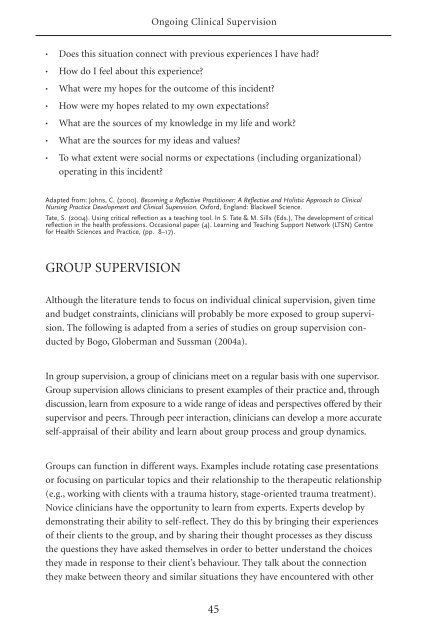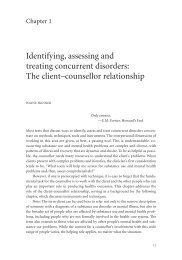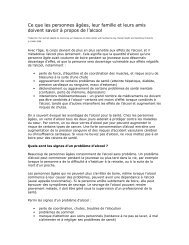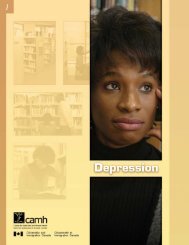Clinical Supervision Handbook - CAMH Knowledge Exchange ...
Clinical Supervision Handbook - CAMH Knowledge Exchange ...
Clinical Supervision Handbook - CAMH Knowledge Exchange ...
Create successful ePaper yourself
Turn your PDF publications into a flip-book with our unique Google optimized e-Paper software.
• Does this situation connect with previous experiences I have had?<br />
• How do I feel about this experience?<br />
• What were my hopes for the outcome of this incident?<br />
• How were my hopes related to my own expectations?<br />
• What are the sources of my knowledge in my life and work?<br />
• What are the sources for my ideas and values?<br />
• To what extent were social norms or expectations (including organizational)<br />
operating in this incident?<br />
Adapted from: Johns, C. (2000). Becoming a Reflective Practitioner: A Reflective and Holistic Approach to <strong>Clinical</strong><br />
Nursing Practice Development and <strong>Clinical</strong> <strong>Supervision</strong>. Oxford, England: Blackwell Science.<br />
Tate, S. (2004). Using critical reflection as a teaching tool. In S. Tate & M. Sills (Eds.), The development of critical<br />
reflection in the health professions. Occasional paper (4). Learning and Teaching Support Network (LTSN) Centre<br />
for Health Sciences and Practice, (pp. 8–17).<br />
GROUP SUPERVISION<br />
Ongoing <strong>Clinical</strong> <strong>Supervision</strong><br />
Although the literature tends to focus on individual clinical supervision, given time<br />
and budget constraints, clinicians will probably be more exposed to group supervision.<br />
The following is adapted from a series of studies on group supervision conducted<br />
by Bogo, Globerman and Sussman (2004a).<br />
In group supervision, a group of clinicians meet on a regular basis with one supervisor.<br />
Group supervision allows clinicians to present examples of their practice and, through<br />
discussion, learn from exposure to a wide range of ideas and perspectives offered by their<br />
supervisor and peers. Through peer interaction, clinicians can develop a more accurate<br />
self-appraisal of their ability and learn about group process and group dynamics.<br />
Groups can function in different ways. Examples include rotating case presentations<br />
or focusing on particular topics and their relationship to the therapeutic relationship<br />
(e.g., working with clients with a trauma history, stage-oriented trauma treatment).<br />
Novice clinicians have the opportunity to learn from experts. Experts develop by<br />
demonstrating their ability to self-reflect. They do this by bringing their experiences<br />
of their clients to the group, and by sharing their thought processes as they discuss<br />
the questions they have asked themselves in order to better understand the choices<br />
they made in response to their client’s behaviour. They talk about the connection<br />
they make between theory and similar situations they have encountered with other<br />
45

















